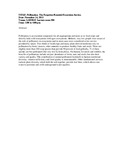| dc.description.abstract | TITLE: Pollination: The Forgotten Essential Ecosystem Service.
Date: November 14, 2013
Venue: LARMAT Lecture room 206
Time: 2:00 to 4:00 pm
Abstract:
Pollination is an essential component for all angiosperms and more so in food crops and directly links wild ecosystems with agro-ecosystems. Hitherto, very few people were aware of the role of pollinators in ecosystems and in most cases were considered a free service provided by nature. Two thirds of food crops and many plant-derived medicines rely on pollination by biotic (insects, other animals) to produce healthy fruits and seeds. There are slightly more than 100 crop species that provide 90 percent of food globally, 71 of these species are bee-pollinated (but very few by honeybees), For human, livestock and wildlife, the benefits of pollination include not just abundance of fruits, nuts and seeds, but also their variety and quality. The contribution of animal-pollinated foodstuffs to human nutritional diversity, vitamin sufficiency and food quality is immeasurable. Other fundamental services include plant diversity which hold the soil together, provide leaf litter, which allows rain water to percolate and refill underground water aquifers. | en_US |

